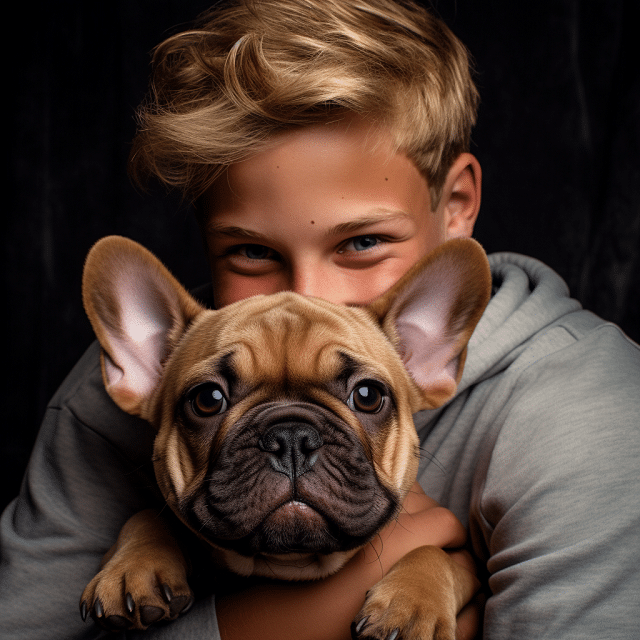French Bulldogs, affectionately known as “Frenchies,” are undoubtedly a charming breed. But are they good around kids? The simple answer is: Yes. French Bulldogs are typically good with kids due to their gentle nature and adaptability. However, as with any breed, their compatibility with children depends largely on their individual temperament, upbringing, and the child’s behaviour.
Understanding the Frenchie’s Temperament
When you observe a French Bulldog, you’ll notice that they are generally calm, friendly, and sociable. Their disposition is typically easygoing, making them great companions for families. However, their interaction with kids is heavily influenced by their temperament.
The American Temperament Test Society (ATTS) conducts an evaluation that offers an insight into this aspect.
The American Temperament Test Society’s (ATTS) Evaluation
The ATTS evaluates a dog’s temperament through various scenario-based tests, focusing on aspects like stability, shyness, aggressiveness, and friendliness. Historically, French Bulldogs have fared quite well in these tests, showcasing their amiable and affectionate nature.
The Frenchie’s Adaptability
French Bulldogs are known for their adaptability, which makes them a great fit for both city living and spacious country homes. This flexibility also extends to their behaviour around kids. They are generally very tolerant and patient with the playful antics of children.

Male Vs. Female Frenchies: Who’s Better with Kids?
Choosing between a male or female French Bulldog, commonly known as a Frenchie, is a decision that often confounds prospective pet owners. Both genders have their unique characteristics, but the impact of these traits on their interaction with children is not as straightforward as it may seem.
Male French Bulldogs
Male Frenchies are often described as more playful, energetic, and assertive than their female counterparts. They typically love engaging in fun activities and games, making them an excellent match for active children who enjoy outdoor play.
However, their assertiveness can sometimes translate into stubbornness, which might require a firmer hand in training. Some owners also note that males are more likely to engage in “marking” behaviours, a trait that can be mitigated with early neutering.
Female French Bulldogs
Females, on the other hand, are usually seen as more reserved and docile. They can be slightly less energetic than males, which could be a better fit for families with younger children or those who prefer quieter, less rambunctious pets.
Females are often perceived as being easier to train due to their less stubborn nature. However, they can also be more sensitive to changes in the household or family dynamics, which could potentially lead to behavioural changes.
Choosing Based on Your Child’s Personality
Despite these general traits, the best predictor of a successful relationship between a Frenchie and a child is often the child’s personality. Active, outgoing children might benefit from a playful male Frenchie’s energy, while quieter, more reserved children might feel more comfortable with a gentler, calmer female.
Additionally, the dog’s individual personality, upbringing, and socialisation play a significant role in their behaviour around children. Both male and female Frenchies can be fantastic family pets when they are properly trained and socialised from a young age.
Remember, each Frenchie is an individual with unique traits and behaviours. Spend time with the specific dog you’re considering adding to your family to see if it’s a good match for your household and your children. Furthermore, consider factors such as the dog’s age, health status, and previous interactions with children.
In conclusion, both male and female French Bulldogs can be wonderful companions for children. The decision should hinge more on the individual dog’s personality and compatibility with your family rather than strictly its gender.
Frenchies: The Velcro Dogs
French Bulldogs are often described as “velcro dogs” due to their propensity to stick close to their owners. This clingy nature can be a source of comfort and security for children, making them a lovable companion.
The Potential Dangers of Raising Frenchies with Kids
Despite their general compatibility, there can be potential challenges when raising French Bulldogs with kids. For example, Frenchies might become territorial over their toys. However, these risks can be mitigated with the right training and supervision.
Teaching Your Kids to Interact with Frenchies
Teaching children how to appropriately interact with a French Bulldog (Frenchie) is crucial for maintaining a peaceful coexistence. This education should focus on respect for the dog’s boundaries and understanding the importance of gentle play.
Understanding Dog’s Body Language
Firstly, children should be taught to read a Frenchie’s body language. Dogs communicate their feelings through physical cues. A wagging tail might indicate happiness, while pulled back ears or a tucked tail could signal fear or discomfort. By understanding these signals, children can learn when it’s appropriate to interact with the Frenchie and when to give it space.
Respecting Boundaries
Respecting the dog’s boundaries is another key aspect. Just like humans, dogs also need personal space. Teach your children not to disturb the Frenchie while it’s sleeping or eating, and never to take away its toys without replacing them with another one.
Children should also learn to avoid potentially sensitive areas like the dog’s ears, tail, and especially their mouth. It’s essential to remember that even the gentlest dogs might react negatively if they feel threatened or irritated.
Encouraging Gentle Play
Promoting gentle play is particularly important when dealing with a smaller breed like French Bulldogs. Due to their compact size, they might be more susceptible to unintentional injuries during rough play. Encourage your kids to engage in calmer activities like throwing a ball for the Frenchie to fetch or gently stroking it when it’s relaxed.
While French Bulldogs are generally tolerant, it’s essential to remind children that they should never pull on the dog’s ears or tail, climb on them, or play too roughly. Emphasize that dogs, like people, can feel pain, and it’s not kind to hurt them.
Positive Interaction
Encourage positive interaction between your child and your Frenchie. This could include allowing the child to help with feeding the dog under supervision, teaching the dog new tricks together, or going for family walks. These shared positive experiences can foster a strong bond between your child and your Frenchie.
Teaching your child these guidelines from an early age can ensure that they interact safely and respectfully with your Frenchie and other dogs they may encounter. Remember, it’s as much about protecting your child as it is about protecting your dog. It’s all part of creating a harmonious home where everyone, including the family pet, feels safe and loved.

Tips for Introducing a Frenchie to Your Kids
Introducing a French Bulldog, or Frenchie, to your children is a significant step that needs to be handled with care. It can set the tone for their future relationship and determine how well they will get along. Here are some tips to ensure this initial introduction goes smoothly:
Preparation
Before bringing your new Frenchie home, it’s essential to prepare your children for the new addition to the family. Explain to them what to expect and establish some ground rules for interacting with the dog. For example, emphasise the importance of gentle touches, giving the dog space when needed, and not startling it when it’s sleeping.
A Calm Environment
Choose a calm, neutral environment for the first meeting. This will help your Frenchie feel less anxious and more comfortable. Make sure there are no loud noises or sudden movements that might scare the dog.
Supervised Interaction
Always supervise the first few interactions between your Frenchie and your children. This way, you can step in if the play gets too rough or if the dog starts to show signs of stress or discomfort. Over time, as they get used to each other, you can allow more freedom, but it’s still essential to keep an eye on them when they’re together.
Gradual Introduction
It’s a good idea to introduce your Frenchie to one child at a time, starting with the oldest or most responsible. Once the dog is comfortable with one child, you can gradually introduce the others.
Positive Association
During the first few meetings, encourage your children to engage in positive interactions with the Frenchie. This might include gentle petting, speaking softly to the dog, or offering treats (under your supervision). This helps to create positive associations between the dog and your children.
Reward Good Behaviour
Reward both the dog and the child for good behaviour. If the Frenchie behaves well around your kids, give it a treat or some affection. Likewise, if your child is gentle and respectful towards the dog, praise them for their good behaviour. This reinforces positive interactions and encourages them to continue behaving well.
Remember, each dog and child is unique, and the speed of their bonding process will vary. Be patient and allow the relationship to develop naturally over time. It’s essential to prioritise safety and ensure that both the dog and your children are comfortable with each other. A well-managed introduction can pave the way for a beautiful, lasting friendship between your Frenchie and your kids.
Teaching Your Kids to Interact with Frenchies
Creating a harmonious bond between children and a French Bulldog, fondly known as a Frenchie, is a rewarding experience. However, it requires teaching your children about the importance of respecting the dog’s boundaries and engaging in gentle play. Here’s how you can do it:
Respect for Boundaries
Educating children about a Frenchie’s need for personal space and respect is crucial. Teach them not to disturb the dog while it’s sleeping or eating, and avoid taking away its toys without replacing them with another one. Explain that these actions might make the dog feel threatened, leading to anxiety or potentially aggressive behaviour.
The Art of Gentle Play
French Bulldogs are sturdy little dogs, but they’re not immune to harm. Teaching children the importance of gentle play is essential to avoid accidents or injuries. Encourage games that are safe for both the child and the dog, such as fetch or hide and seek with toys. Discourage actions like pulling on the dog’s ears or tail or trying to ride the dog, as these actions can lead to injury or distress.
Caring for Your Frenchie: A Task for the Kids?
Involving children in caring for a pet can teach them valuable life skills, including responsibility, empathy, and respect for other living beings. Here’s how you can safely involve them in caring for your Frenchie:
Feeding
Under supervision, allow your child to help with feeding your Frenchie. This could involve pouring the food into the bowl or giving the dog a treat after a successful training session. Ensure they understand the importance of a healthy diet for the dog and why overfeeding or sharing human food can be harmful.
Grooming
Depending on their age and ability, children can also help with grooming tasks. Brushing the Frenchie’s coat is a task that most children can handle and it’s an excellent way for them to bond with the dog. Make sure to teach them to be gentle and to watch the dog’s body language to ensure it’s comfortable.
Walking
Older children might be able to help with walking the Frenchie. Given the breed’s moderate exercise needs, a short walk around the block can be a manageable task for a responsible child. Always ensure that the child is strong enough to hold onto the leash if the dog pulls and that they understand basic road safety rules.
By involving children in the care of your Frenchie, they not only learn valuable skills but also build a stronger bond with the pet. Supervision and regular guidance are key in these early stages to ensure both your child’s and your pet’s safety and well-being.
Frequently Asked Questions (FAQs) Answers
| Frequently Asked Questions (FAQs) | Answers |
|---|---|
| Do French Bulldogs bite kids? | French Bulldogs are not typically aggressive. However, like any breed, they can bite if provoked or stressed. It’s essential to teach children how to interact with them properly. |
| Can French Bulldogs be left alone with kids? | While French Bulldogs are generally good with children, unsupervised interactions are not recommended, especially with younger kids. |
| Are French Bulldogs safe for babies? | With proper supervision and boundaries, French Bulldogs can safely interact with babies. However, it’s important to never leave any dog, regardless of breed, alone with a baby. |
| How tolerant are French Bulldogs to noisy environments? | French Bulldogs, often known for their easygoing nature, can typically adapt to a variety of environments, including noisy households. However, like any breed, they can become stressed if the noise is too loud or constant. Therefore, teaching children to respect the dog’s quiet times can contribute to a healthier, happier Frenchie. |
| Can French Bulldogs handle rough play? | Due to their sturdy yet compact size, French Bulldogs may appear capable of handling rough play. However, it’s essential to remember that they are not as robust as they seem. Overly rough or vigorous play can lead to accidental injuries. Teach children to engage in gentle, controlled play with the Frenchie to ensure the safety of both parties. |
| Are French Bulldogs good for first-time pet owners? | French Bulldogs are often recommended for first-time pet owners due to their friendly nature and manageable size. However, potential owners should be aware of the breed’s specific health needs and grooming requirements. Encouraging children to participate in caring for the Frenchie can also provide a great learning experience about pet ownership. |
| How well do French Bulldogs get along with other pets? | French Bulldogs generally get along well with other pets, especially if they’ve been socialised from a young age. However, individual temperaments can vary, so it’s important to introduce new pets slowly and under controlled conditions. Involving older, responsible children in this process can teach them about animal behaviour and socialisation. |
| Are French Bulldogs hypoallergenic? | No, French Bulldogs are not considered hypoallergenic. They do shed, although not as much as some other breeds, and their dander can trigger allergies in sensitive individuals. If a family member has pet allergies, it’s crucial to spend time with a Frenchie before bringing one into the home to see if reactions occur. |

